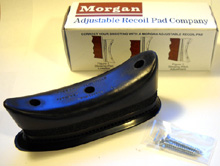
Here's a pic of another sleeve I made last year for the IZH-61. Sleeve was made exactly the same way and the results were the same. Just pretend this sleeve is longer. The original spring fit like a dream.

Instead of moly this time around, I used Permatex copper based anti-seize. This is the stuff that Beeman used to send when you got the "Laser" upgrade kit for your R-1--only they called it Beeman Laser Lube and charged accordingly.

Marked "for titanium" because I use it on titanium fasteners instead of grease or aluminum based anti-seize.

The piston seal got a thin coat. The piston body, even less.

Only this much.

Psycho Lube. I don't think this grease is made anymore. I can't find a web site for it. I think I got it at a trade show a couple years ago. It's a "high performance" synthetic bearing grease. It's translucent and feels slicker than moly. I rebuilt the pivot, barrel latch, and cocking lever with it.

Thin coat of copper anti-seize on the mainspring. Reassembled as before and shot some targets. Gave it about 100+ shots to settle in and set up the chronograph. As usual, RWS Hobby wadcutters were used as a baseline pellet.

Wow, this is on the hot side for a Weihrauch 35! A ten-shot string ranged from 802.6 to 816.7 fps. This may well be my stopping point for internal work.

Gonna leave this one set up with the diopter sights. I've got enough scoped rifles and need some variety.

Found some brass set screws for the original sight holes, but next up is probably a cover plate.
Note: HW sight mounting holes are an extremely odd metric thread size-- M5 x 0.5

4 comments:
Derrick
How does it feel now? If it was harsh at 750, it would seem like 81X would be harsher, but then you did other things.
What kind of cool stuff do you get to work on, besides this cool stuff?
Your comment on the permatex reminded me that I have a titanium seatpost that is probably permanently welded via electrolysis to my IF deluxe frame. Oh well.
SL,
The harshness is due to the quick sharp recoil. There's no vibration or spring torque sensation at all. Gotta be from the heavy piston.
Besides the airguns, I get to play with all kinds of carbon fiber aluminum and titanium bikes and all the hydraulic brakes, forks...There's worse jobs.
Hello from The UK. I really enjoyed your HW35E strip down and so much so I scoured the net and airgun shops until i found an identical age and condition HW35E here in the UK. I owned an old HW35e as a teenager bought from a boot fair in 1988 and this got lost in the realms of time at some point. I wanted a .177 but couldnt pass on the one I found which is .22, It also has a 22" barrel which i'm told is quite rare. The rifle is very consistant power wise and shoots 590 ft/sec pretty much every shot. I dont think the rifle has seen much use and probably has sat in a cupboard for 30 years. My only gripe with this rifle is that it kicks like a
mule.. would a strip down and tune up like the one you carried out lessen the recoil? Theres no twang or rattle as such it just fires like a cannon at the moment. my profession is more electronic than mechanical best regards Dave
Dave,
The recoil is still there. A loose hold on the gun helps immensely. The tune is beneficial to reduce the cocking effort/noise as well as damp the spring twang and buzz completely. There's also benefit in fitting a better fitting spring guide and tightening the spring fit inside the piston. This ensures that the spring is compressed in a straight line rather than kinking sideways slightly. It should help extend the spring's lifespan.
Post a Comment